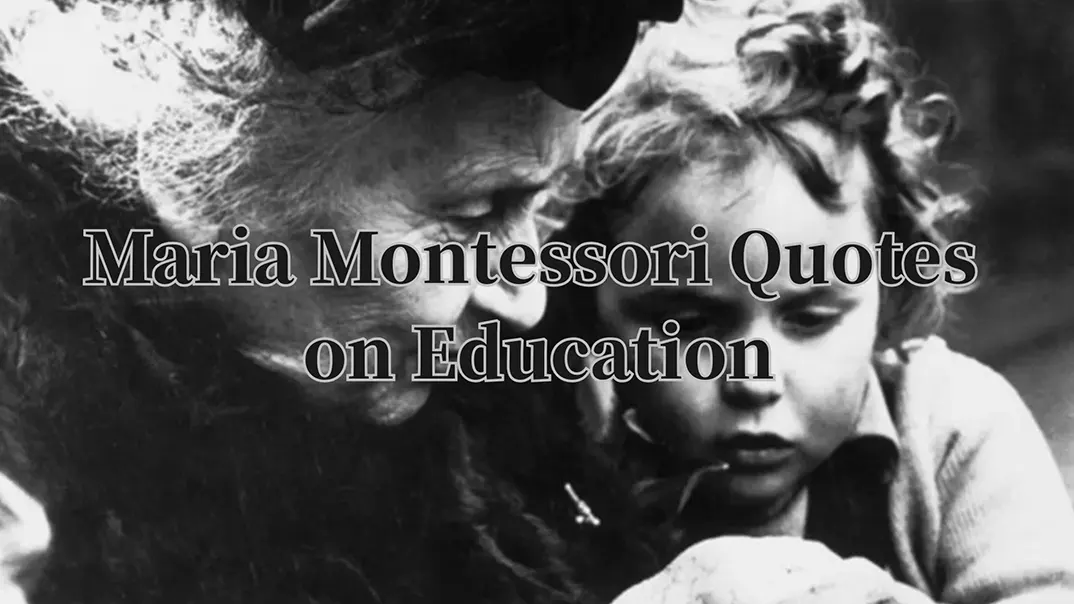At the start of the 20th century, Maria Montessori introduced a revolutionary idea: that education should nurture the natural development of the child. In a world dominated by rigid instruction, her voice became a powerful advocate for learning through freedom and respect.
If you’ve ever sought a deeper understanding of her vision, exploring her own words is the perfect place to start. In this curated list of 60+ Maria Montessori quotes, we explore the depth of her educational insights. These quotes serve as both inspiration and practical guidance, reminding us why her philosophy continues to resonate across generations.
Maria Montessori Quotes from The Montessori Method (1912)
Published in 1912, The Montessori Method was Maria Montessori’s first major work to introduce her educational philosophy to an international audience. Originally written in Italian as Il Metodo della Pedagogia Scientifica applicato all’educazione infantile nelle Case dei Bambini, the book outlines her scientific approach to education, based on years of observation and experimentation with young children in Rome.
In this foundational text, Montessori challenges conventional methods and instead promotes self-directed activity, hands-on learning, and the preparation of an environment that fosters independence and discipline. Her revolutionary ideas laid the groundwork for what is now known as the Montessori movement, reshaping the landscape of early childhood education.
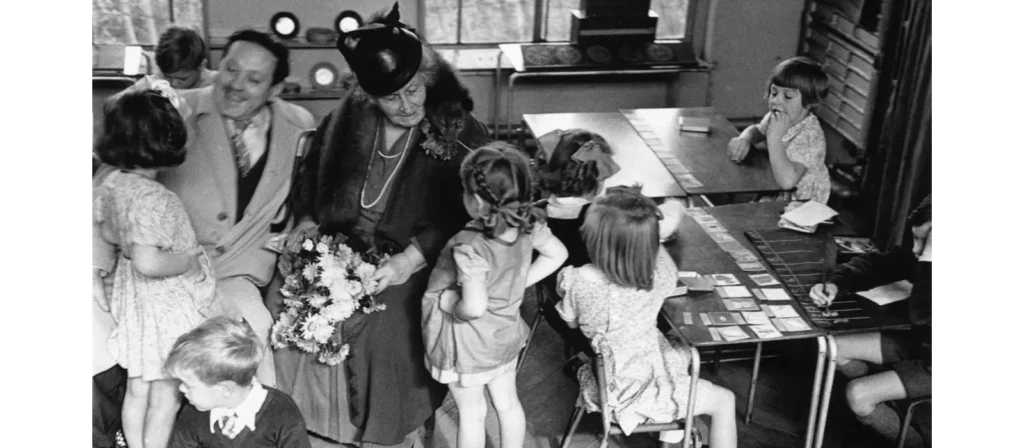
1. “The first essential for the child’s development is concentration. The child who concentrates is immensely happy.”
Montessori believed that concentration is not just a mental state but a vital element of a child’s personal growth. When children focus deeply on a meaningful task, they experience joy because they are in harmony with their natural desire to learn. This moment of concentration transforms restlessness into peace, distraction into purpose. The teacher’s role is not to interrupt this process but to protect it, allowing the child to remain fully engaged.
2. “Education is a natural process carried out by the child and is not acquired by listening to words but by experiences in the environment.”
This statement defines Montessori’s entire educational vision. She insisted that learning happens through active exploration, not passive instruction. Children learn by touching, experimenting, and making sense of the world around them. Words alone cannot replace experience, just as reading about swimming cannot teach one to swim. For educators and parents, this insight calls for the creation of environments rich in sensory, social, and intellectual stimuli.
3. “The greatest sign of success for a teacher is to be able to say, ‘The children are now working as if I did not exist.’”
Montessori redefines the role of the teacher as a guide rather than a central authority. True success, she explains, is achieved when the teacher becomes almost invisible because the children are so engaged and independent that they no longer rely on constant direction. The Montessori educator observes, guides, and then steps back, allowing freedom within structure. This quote challenges educators today to trust in children’s abilities and to view autonomy as the highest measure of success.
4. “Discipline must come through liberty… We do not consider an individual disciplined only when he has been rendered as artificially silent as a mute and as immovable as a paralytic. He is an individual annihilated, not disciplined.”
Here, Montessori rejects authoritarian models of discipline that demand silence and stillness. Instead, she argues that true discipline is an internal process that arises through the freedom to make choices and experience consequences. This quote is powerful in dismantling outdated views on classroom management. In a Montessori environment, discipline is not imposed from the outside but nurtured from within through respectful freedom and responsibility.
5. “To assist a child, we must provide him with an environment which will enable him to develop freely.”
Montessori places the environment at the center of education. Every detail in the classroom, from furniture height to the arrangement of materials, should support the child’s autonomy. By allowing children to move, choose, and explore freely, we cultivate responsibility and confidence. This principle extends beyond the classroom: a home, too, should be designed to empower children rather than restrict them. The prepared environment becomes a silent teacher that shapes character and intellect simultaneously.
6. “It is true that we cannot make a genius. We can only give each child the chance to fulfill his potential possibilities.”
This quote reflects Montessori’s deep respect for individuality. She rejects the idea of producing exceptional children through pressure or competition and instead advocates for an education that enables every child to reach their full potential. Genius, in her view, is not something imposed but something revealed through opportunity and encouragement. Each child possesses unique abilities waiting to be nurtured through freedom, respect, and purposeful work.
7. “The hands are the instruments of man’s intelligence.”
Montessori saw the hand as a direct link between the body and the mind. Through purposeful movement and manipulation of objects, children internalize complex ideas. Montessori saw a direct link between movement and thought. Through hands-on activities, children build knowledge and understanding. Practical experiences such as pouring, stacking, or sorting develop both coordination and intelligence.
Maria Montessori Quotes from The Advanced Montessori Method – Volume 1 & 2 (1917–1918)
The Advanced Montessori Method, published in two volumes between 1917 and 1918, represents an expansion of Montessori’s educational approach beyond early childhood. Volume 1 focuses on elementary education mathematics, grammar, and cultural studies, while Volume 2 dives deeper into sensorial and motor development.
These books show Montessori refining her theories and applying them to older children, emphasizing abstraction through concrete experiences, continuity of learning, and the child’s evolving moral and social development. Her insights laid the foundation for a full progression of Montessori education from early childhood through adolescence.
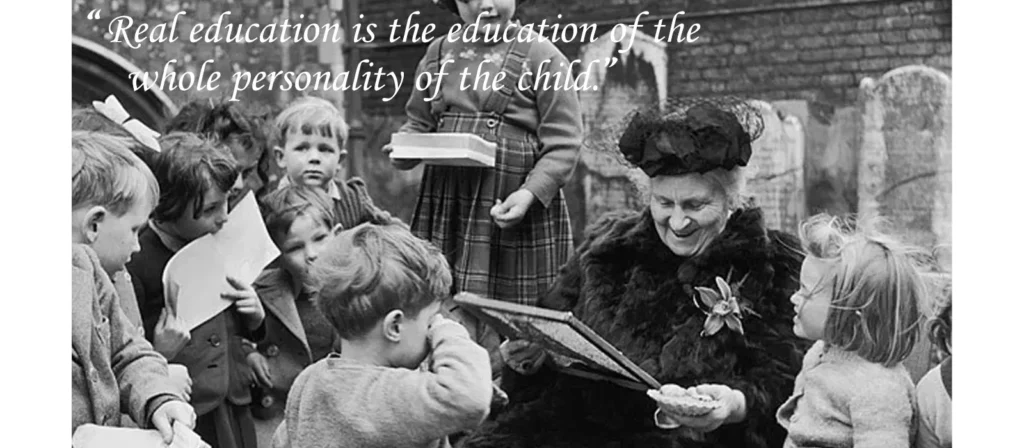
8. “The child, in fact, once he feels sure of himself, will no longer seek the approval of authority after every step.”
This quote reflects Montessori’s belief in building genuine self-confidence. When children are trusted with independence, they begin to rely on their own judgment rather than constant praise. True confidence does not come from approval but from repeated success in meaningful tasks. Montessori encourages educators to withdraw unnecessary intervention. Over time, this fosters self-assurance and internal motivation.
9. “The teacher must derive not only the capacity but the desire to observe natural phenomena. In our system, she must become a student of the child.”
Montessori describes observation as the teacher’s most essential tool. Rather than leading every activity, the educator watches, listens, and learns from the child’s behavior. Observation helps the teacher respond to individual needs with precision and care. In this role, humility and patience are as valuable as knowledge. Understanding the child begins with genuine curiosity and attention.
10. “We must help the child to act, think, and will for himself. This is the art of serving the spirit.”
Montessori links education to the child’s inner life. Encouraging independence in thought and action supports the growth of character and will. Education becomes a spiritual task when it honors the full humanity of the child. Helping a child develop autonomy is more than teaching skills. It is an act of respect that nurtures both freedom and responsibility.
11. “Real education is the education of the whole personality of the child.”
Montessori insisted that academic achievement is only part of a child’s development. Education should support emotional growth, social understanding, and ethical awareness. By nurturing the whole personality, schools prepare children for life, not just for exams. This approach values how children relate to others, how they make decisions, and how they care for their environment. A well-rounded education builds character along with intellect.
12. “The senses, being explorers of the world, open the way to knowledge.”
This statement captures the foundation of Montessori’s sensorial materials. Children begin to understand the world through what they see, hear, touch, taste, and smell. By refining these senses, they prepare their minds for more abstract learning. Concrete experiences serve as a bridge to later intellectual concepts. Montessori classrooms are designed to stimulate the senses in precise and intentional ways.
13. “The child’s mind is like a fertile field, ready to receive what will germinate into knowledge.”
Using this metaphor, Montessori illustrates the child’s natural readiness to learn. Like a field prepared for planting, the mind responds to what is offered in the environment. Educators must provide rich, meaningful content that supports development without overwhelming it. Learning happens best when materials and experiences match the child’s stage of growth. With care and time, knowledge takes root and grows steadily.
14. “The exercises of practical life are formative activities, a work of adaptation to the environment. Such adaptation to the environment and efficient functioning therein is the very essence of a useful education.”
Montessori highlights the importance of practical life work as the foundation of real-world competence. Pouring, sweeping, buttoning, and similar tasks help children master their physical world. These actions promote coordination, independence, and concentration. Through repetition, children gain both skill and confidence. Montessori considered these exercises essential for helping children feel at home in their environment and capable of managing daily life.
Maria Montessori Quotes from The Discovery of the Child (1948)
The Discovery of the Child was published in 1948 and presents a mature reflection on Montessori’s educational journey. In this book, she revisits her original experiments in the Bebek Evi and refines many of her earlier concepts. The focus remains on the child’s natural development, but the tone reveals a deeper philosophical conviction. Montessori argues that true education must begin by understanding the nature of the child. She emphasizes the role of freedom, movement, and purposeful activity in the development of intelligence, will, and character.
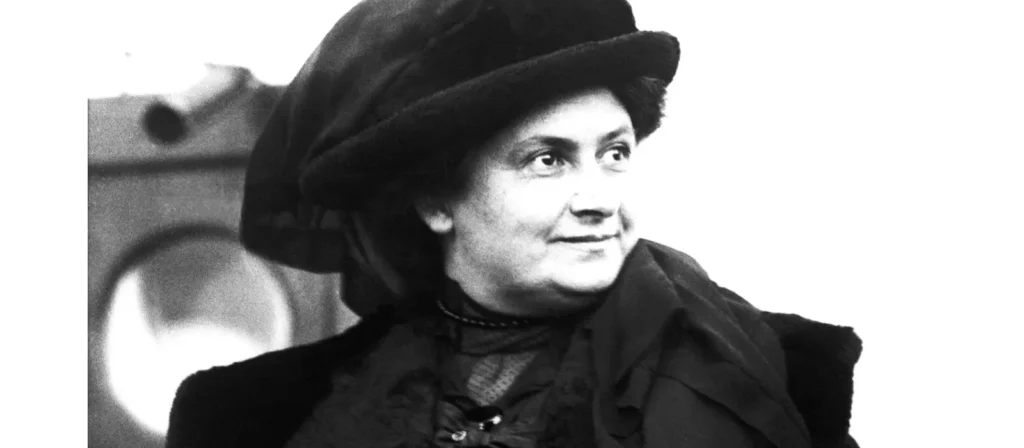
15. “The child has a mind able to absorb knowledge. He has the power to teach himself.”
Montessori highlights the self-constructive nature of the child’s mind. Children do not need to be filled with knowledge from the outside; they are equipped to build it from within. When placed in the right environment, they naturally explore, question, and learn. This principle underlines the trust Montessori places in children’s internal drive. Learning becomes a process of discovery, not instruction.
16. “A child is a discoverer. He is an amorphous, splendid being in search of his own proper form.”
This poetic line captures the essence of Montessori’s view of early development. The child is not a miniature adult but an evolving person finding shape through interaction with the world. Each experience adds to the formation of identity and intellect. Montessori sees education as a tool to support this search. Adults must observe without interfering, and guide without controlling.
17. “The first step in the child’s education is the winning of his confidence and the making of him feel that he is loved.
Before academic learning can begin, Montessori insists on emotional safety. When children feel accepted and valued, they become open to growth and exploration. Trust and affection are the foundation of any real education. This principle speaks directly to the relationship between the child and the adult. Warmth and respect are not extras; they are essential.
18. “Respect all the reasonable forms of activity in which the child engages and try to understand them.”
Montessori advises adults to suspend judgment and observe children with care. What may appear trivial could be essential for development. When children repeat actions or engage in focused tasks, they are often working toward mastery. Respecting these moments nurtures confidence and curiosity. Educators should resist the urge to interrupt or redirect prematurely.
19. “We do not teach the child these things. He learns them by himself.”
This quote challenges conventional assumptions about instruction. Montessori points out that true learning arises from within the child. Adults prepare the environment and offer tools, but they do not produce understanding. The child’s active participation is what leads to mastery. This approach empowers learners and transforms the adult’s role into that of a facilitator.
20. “Movement helps the development of the mind, and this finds expression in the child’s own activity.”
In contrast to static classroom traditions, Montessori places movement at the heart of learning. Children need to move to think clearly and develop cognitive skills. Their physical actions are not distractions but vital parts of understanding. This idea is reflected in Montessori classrooms, where children work freely with their hands and bodies. Mental growth and physical activity are deeply connected.
21. “The child is truly a miraculous being, and this should be felt deeply by the educator.”
Montessori reminds us that education begins with awe and respect. Every child carries unique potential and an inner drive toward growth. When teachers see children as extraordinary human beings rather than objects of instruction, the entire educational relationship changes. This attitude creates empathy, patience, and inspiration in the classroom.
Maria Montessori Quotes from The Absorbent Mind (1949)
Published in 1949, The Absorbent Mind is one of Maria Montessori’s most influential works. In this book, she explores how children from birth to age six absorb knowledge effortlessly from their surroundings. She explains that this “absorbent mind” is the foundation of all later intellectual and emotional growth. Montessori describes early childhood as a period of incredible mental activity in which the child builds their personality through interaction with the environment.
The book also emphasizes the responsibility of adults to provide a rich, orderly, and nurturing environment. Montessori shows that education must begin from birth and that teachers and parents must understand the child’s unconscious process of self-construction. The following quotations express some of her most profound insights about childhood, learning, and human development.
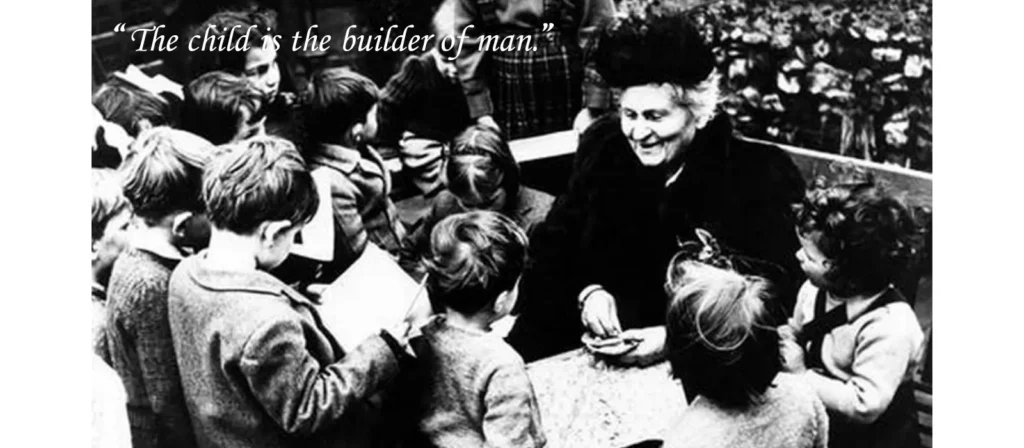
22. “The child is the builder of man.”
This quote expresses Montessori’s belief that everything human beings become has its origin in early childhood. The child’s experiences, actions, and emotions form the foundation of character and intellect. Adults should therefore respect the child as a creator of humanity itself. Supporting development during this stage means shaping the future of mankind.
23. “Impressions do not merely enter a child’s mind; they form it.”
Montessori emphasizes that the environment does more than influence the child; it creates the structure of the mind itself. Every sound, sight, and gesture leaves a mark that becomes part of the child’s identity. Because of this, she urges adults to provide beauty, harmony, and meaningful activity in every moment of a child’s life.
24. “The first essential for the child’s development is concentration.”
Concentration is, for Montessori, the foundation of all education. When a child becomes absorbed in an activity, they build inner order and peace. Such moments reveal the unity of body and mind in action. The teacher must protect these states of focus, allowing the child to complete each task without unnecessary interruption.
25. “The things he sees are not just remembered; they form part of his soul.”
Montessori speaks of the deep spiritual effect of the environment. What a child sees and experiences becomes part of their inner world, influencing feelings, imagination, and thought. The environment must therefore be gentle, ordered, and full of beauty so that the child’s soul is shaped by harmony rather than confusion.
26. “Education is a work of self-organization, by which man adapts himself to the conditions of life.”
Montessori presents education as a process of internal growth. The child organizes the mind through contact with the environment and through independent activity. True learning cannot be imposed; it arises from the natural effort to understand and adapt. The teacher’s role is to guide this process by preparing conditions that support it.
27. “The human hand allows the mind to reveal itself.”
This quote captures Montessori’s conviction that movement and thought are inseparable. When children use their hands to explore, their minds express understanding through action. Manual activity connects intelligence to the real world. The hand, as an instrument of the mind, brings ideas to life and transforms abstract thought into experience.
28. “The environment must be rich in motives which lend interest to activity and invite the child to conduct his own experiences.”
Montessori teaches that curiosity is the natural source of learning. A rich environment filled with order and beauty awakens this curiosity and inspires purposeful action. When children are free to choose meaningful work, they develop independence, satisfaction, and discipline that arise from within rather than from external pressure.
29. “The child’s mind between three and six years can be compared to a sponge, which absorbs everything without effort.”
Through this metaphor, Montessori describes how easily children take in information during early childhood. Everything in their surroundings becomes part of their development, from language to social behavior. Because of this sensitivity, adults must provide clarity, gentleness, and respect so that what is absorbed contributes to growth and goodness.
30. “The greatness of the human personality begins at the hour of birth.”
Montessori affirms that human potential exists from the very beginning of life. The newborn is not empty but full of hidden powers ready to unfold. Recognizing this truth changes the way adults care for infants. Respect, attention, and love from the first moments of existence are the true beginnings of education.
Maria Montessori Quotes from The Secret of Childhood (1936)
The Secret of Childhood, originally published in French in 1936 and later translated into English, offers an intimate look into the emotional and psychological world of the young child. In this work, Montessori introduces foundational ideas such as the sensitive periods, the inner teacher, and the spiritual embryo. She emphasizes the need for adults to observe children with greater humility and awareness. The book is both scientific and philosophical, urging society to understand that true education begins with deep respect for the child’s inner life and natural development.
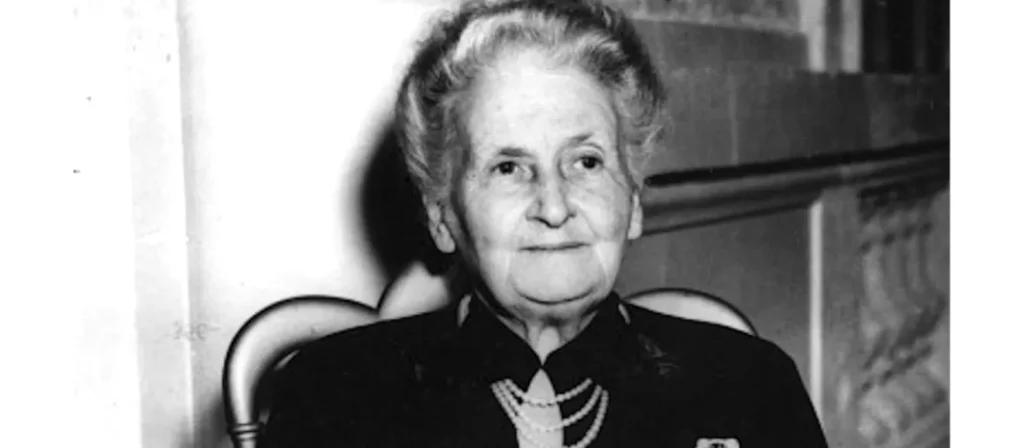
31. “Respect all the reasonable forms of activity in which the child engages and try to understand them.”
Montessori urges adults to pause before interrupting or judging a child’s behavior. Even when an activity appears meaningless to the adult, it may serve a deep developmental purpose for the child. Repetition, movement, and concentration are signs of growth. Through observation, we come to see the logic behind these actions. This respect builds trust and supports the child’s independence.
32. “It is not enough for the teacher to love the child. She must first love and understand the universe.”
Montessori believed that true teaching requires more than affection. It requires a sense of awe for life and a desire to guide the child within a greater cosmic context. The teacher should connect the child with the natural world, society, and the larger rhythm of existence. This understanding brings depth to the educator’s work. It transforms teaching into a spiritual act of service.
33. “The child is truly a miraculous being, and this should be felt deeply by the educator.”
This quote reflects Montessori’s belief in the sacredness of childhood. The educator must approach the child not with control, but with reverence and wonder. Teaching is not about managing behavior but about nurturing the unfolding of life. When this attitude is present, the classroom becomes a place of harmony. The miracle is not in the method, but in the child himself.
34. “What the hand does, the mind remembers.”
Montessori affirms the essential role of hands-on experience in cognitive development. When children touch, build, and manipulate objects, they internalize knowledge more deeply than through words alone. Movement activates memory, attention, and understanding. Montessori materyalleri are designed for exactly this purpose. The hand becomes a pathway to knowledge and clarity.
35. “To assist a child, we must provide him with an environment which will enable him to develop freely.”
This quote summarizes one of Montessori’s central ideas: the prepared environment. Rather than shaping the child directly, we shape the world around him. When the environment supports exploration and independence, the child grows naturally. Freedom within order becomes the foundation for discipline and learning. It is not the adult, but the setting, that teaches best.
Maria Montessori Quotes from Education and Peace (1949)
Education and Peace is a collection of Maria Montessori’s public lectures and essays delivered at international peace conferences between 1932 and 1939, later published posthumously in 1949. In these texts, Montessori argues that lasting peace cannot be achieved through political treaties or force but must be cultivated in the hearts of children through education.
She believed that building peace begins with the child, and the classroom is the training ground for tolerance, cooperation, and moral awareness. This book presents education not just as academic instruction, but as a social and ethical mission for global harmony.
36. “Establishing lasting peace is the work of education; all politics can do is keep us out of war.”
Montessori distinguishes between the temporary efforts of politics and the permanent influence of education. While governments may prevent or provoke conflict, only education can change how people think and relate to one another. Peace must be built through values, understanding, and mutual respect. Schools are not neutral spaces but are where society chooses what kind of future it wants to create.
37. “Preventing conflicts is the work of politics; establishing peace is the work of education.”
This quote reinforces Montessori’s belief that peace is proactive, not passive. It cannot be achieved merely by avoiding conflict. Instead, peace must be consciously cultivated through experiences that promote empathy and shared responsibility. Education must train individuals not only to coexist but to cooperate. The foundation of peace lies in how we raise children to see themselves and others.
38. “Averting war is the work of politicians; nurturing peace is the work of educators.”
Montessori’s emphasis here is on the lasting impact of education. Politicians respond to crises, but educators shape generations. Through respectful guidance and freedom within limits, teachers help children form values that support peaceful living. The work of peace begins long before conflict arises. It is built through daily acts of kindness, fairness, and understanding.
39. “Peace is a goal that can only be attained through common accord, and not by force.”
This statement reflects Montessori’s rejection of violence as a solution to human problems. She believed that true peace is born of dialogue and cooperation. Children must be shown that listening, compromise, and empathy are powerful tools. Education should give them practice in resolving differences with words instead of weapons. Peace built on understanding is more lasting than peace imposed by authority.
40. “Education is the best weapon for peace.”
Montessori reframes education as a tool not for personal success alone but for collective well-being. Knowledge must come with moral development. In classrooms where children are respected, free to explore, and learn to care for one another, the seeds of peace are planted. Educators are not just instructors but peacebuilders shaping the conscience of society.
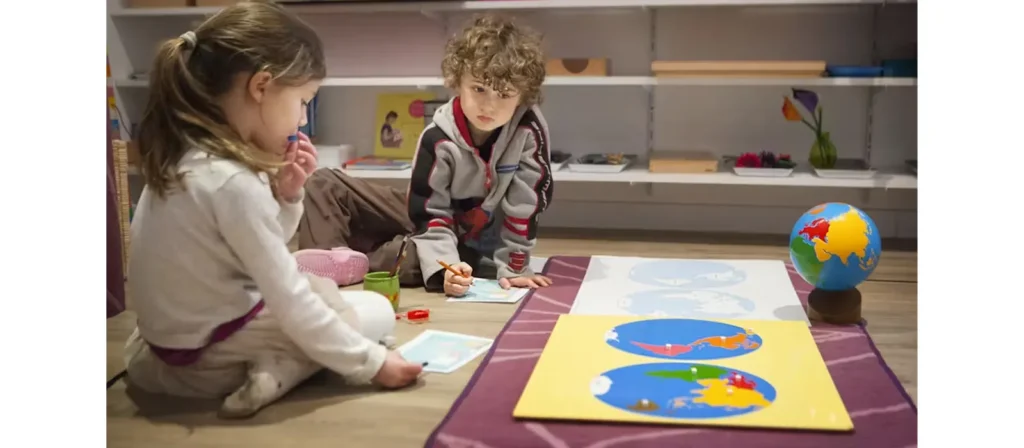
41. “The child is both a hope and a promise for mankind.”
This quote, which also appears in other works, gains deeper meaning in the context of peace education. Montessori saw the child not only as a learner but as a carrier of human potential. To build a peaceful world, we must begin with the child’s emotional and moral formation. Every child represents a possibility to create a better future. Education should nourish this promise, not suppress it.
42. “The only thing the educator can do is prepare the child for the good, directing him toward constructive choices.”
Montessori believed that education must be rooted in ethical purpose. Teachers cannot force peace, but they can guide children to recognize what is right. The goal is not control, but conscience. Children must experience what it means to choose fairness, honesty, and respect. A peaceful society is built by people who have learned to choose peace freely.
Maria Montessori Quotes from To Educate the Human Potential (1948)
To Educate the Human Potential was published in 1948 and focuses on education for children between six and twelve years old. Montessori outlines a vision that moves beyond early childhood and into the second plane of development, where imagination, moral reasoning, and a thirst for knowledge begin to emerge.
She believed this age group should be offered the universe as a context for learning. The book emphasizes the importance of cosmic education, showing children how all things are interconnected and encouraging them to find their unique place in the world.
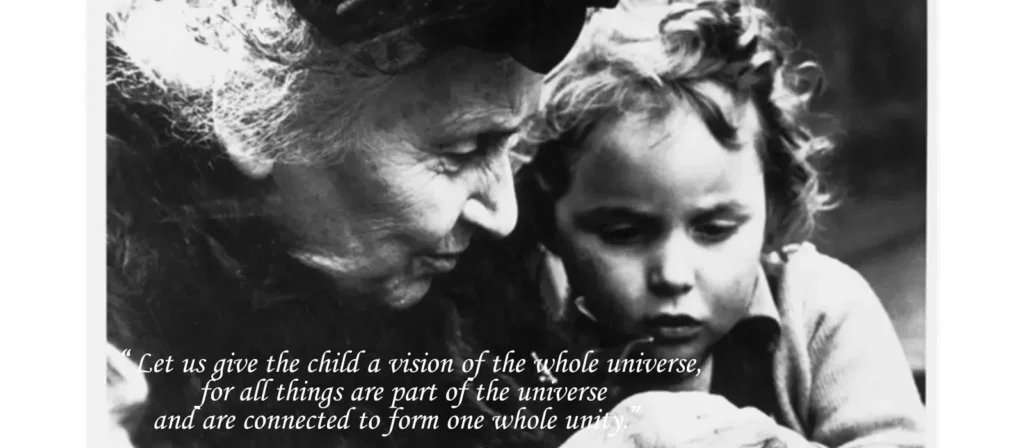
43. “The stars, earth, stones, life of all kinds form a whole in relation with each other, and so close is this relationship that we cannot understand a stone without some understanding of the great sun.”
This sentence captures the essence of cosmic education. Montessori invites teachers to show children the unity of all creation. Every element of the universe is connected, and true knowledge requires recognizing these relationships. Learning geography, biology, or astronomy becomes a way to discover harmony in nature and respect for the world.
44. “The aim of education should not be to fill the child with facts but to cultivate understanding and enthusiasm for learning.”
Here, Montessori distinguishes real education from simple memorization. Facts alone do not develop the mind; curiosity and comprehension do. The teacher’s task is to spark a desire to explore, so that learning becomes self-driven and joyful. When enthusiasm guides study, knowledge takes root deeply and meaningfully.
45. “The imagination is a great power which prepares us to grasp reality when it is presented to us.”
Montessori viewed imagination not as fantasy but as a vital part of reasoning. During the elementary years, children use imagination to connect ideas and visualize unseen processes such as the formation of the Earth or the movement of the stars. Encouraging imagination allows children to understand abstract concepts through vivid mental exploration.
46. “The child who has felt a strong love for the environment and for all living creatures, who has discovered joy and enthusiasm in work, gives us reason to hope that humanity can develop in a new direction.”
This passage links education to the future of civilization. Montessori believed that when children learn to love the world and its living beings, they grow into adults who seek harmony rather than conflict. Emotional connection to nature and purposeful work lay the foundation for peace and moral strength.
Herhangi bir sorunuz varsa veya teklif talep ediyorsanız bize bir mesaj gönderin. Uzmanlarımız size 48 saat içinde yanıt verecek ve istediğiniz doğru ürünü seçmenize yardımcı olacaktır.
47. “Let us give the child a vision of the whole universe, for all things are part of the universe and are connected to form one whole unity.”
This quote summarizes the goal of cosmic education. Montessori asks teachers to begin with the big picture and then move to detail. When children see the unity of all knowledge, they understand that every subject is part of a larger story. This approach nurtures respect for life and inspires gratitude for the interconnected world.
48. “The land is where our roots are. The children must be taught to feel and live in harmony with the Earth.”
In this line, Montessori expresses her ecological awareness long before environmental education became common. She saw the earth as both home and teacher. By guiding children to appreciate the land, educators cultivate stewardship, gratitude, and responsibility toward nature.
49. “Education between the ages of six and twelve is not a direct continuation of that which has gone before. It is a transition to a new stage of life.”
This statement describes the shift from the absorbent mind of early childhood to the reasoning mind of the older child. Montessori explains that this period demands different methods and materials. Intellectual growth now requires exploration, discussion, and moral reflection rather than simple sensory experiences.
50. “Knowledge can be best given where there is eagerness to learn, so this is the period when the seed of everything can be sown.”
This is one of the most quoted lines from the book. Montessori reminds teachers that between six and twelve years old, curiosity is strongest and most receptive. If this period is used wisely, children develop lifelong interests and intellectual independence. Education at this age plants the seeds of future wisdom.
51. “The history of the universe is our own history, and the story of mankind is also our story.”
Through this idea, Montessori links personal identity to the cosmic narrative. By learning how the earth and humanity evolved, children gain perspective on their place in time and culture. This vision encourages respect for all peoples and an appreciation for the continuity of life.
52. “The child is endowed with unknown powers which can guide us to a radiant future if what is in him is brought to light.”
This quote expresses Montessori’s lifelong faith in the potential of every child. She believed that within each human being lies the seed of creativity, intelligence, and goodness. The task of education is to reveal these inner powers. When nurtured with respect and trust, they can transform society and ensure a brighter future for all.
Maria Montessori Quotes from The Formation of Man (1955)
Published in 1948, To Educate the Human Potential is one of Maria Montessori’s key works written for the elementary stage of education. In this book, she explains that the purpose of education is not simply to teach knowledge but to help the growing child understand their place in the universe. Montessori introduces the concept of “cosmic education,” which connects every subject to the interdependence of life and the unity of creation.
She also emphasizes that the years from six to twelve represent a time of great intellectual curiosity. Children want to explore the world beyond their immediate surroundings and discover how things work. Montessori believed that by nurturing this imagination and sense of wonder, education could awaken moral awareness, social responsibility, and love for humanity. The following verified quotations reflect her deep vision of the child’s potential and the educator’s role in guiding it.
53. “The child is the builder of man, and no man exists who has not been formed by the child he once was.”
This quote captures Montessori’s core belief that early childhood lays the foundation for all future development. What we become as adults is shaped by what we experience in childhood. Education must therefore respect the child’s formative powers. The adult is not separate from the child, but the result of the child’s work. This understanding calls for greater care in early education.
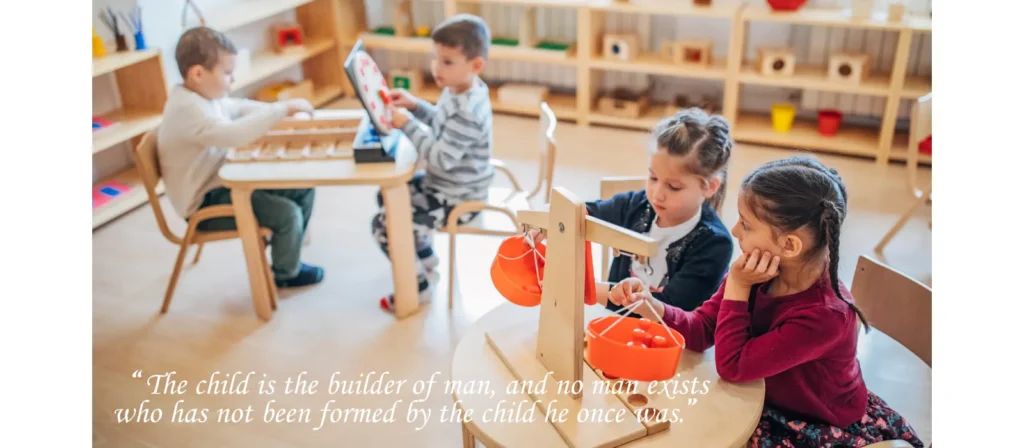
54. “Education is a natural process actively carried out by the individual and is acquired not by listening to words but by experiences in the environment.”
Montessori rejects passive learning through lectures or memorization. Instead, she stresses the importance of real-world interaction and purposeful activity. Children learn best through doing, not through being told. The environment becomes the teacher, offering endless opportunities for exploration. The adult’s role is to prepare that space with care and intention.
55. “The study of the child… is the study of human nature.”
For Montessori, observing children is not just a matter of educational theory. It is a window into the essence of what it means to be human. The child reveals instincts, drives, and patterns that underlie all development. Education becomes a form of anthropology. When we study the child, we gain insight into the possibilities and direction of human evolution.
56. “The education of even a small child, therefore, does not aim at preparing him for school, but for life.”
Montessori saw education as a preparation for living meaningfully and responsibly. The goal is not to pass exams or conform to systems, but to develop character, independence, and moral insight. Every lesson, activity, and relationship in the learning process should support life skills. Education should help the child grow into a capable, thoughtful, and peaceful adult.
57. “If education is always to be conceived along the same antiquated lines of a mere transmission of knowledge, there is little to be hoped from it in the bettering of human society.”
Montessori critiques traditional schooling as outdated and insufficient. Merely passing down facts does not help children become problem-solvers, collaborators, or ethical thinkers. A meaningful education must engage the spirit and purpose of the learner. It must evolve to meet the real needs of humanity. Without reform, education cannot support progress.
58. “We must therefore turn to the child as the key to the fate of our future life.”
This quote expresses Montessori’s deep conviction that children hold the answers to humanity’s challenges. The way we educate and treat children will shape the future of society. Investing in early development is not only personal, but cultural and political. Educators are not just teaching individuals. They are participating in the formation of future civilizations.
59. “The child is endowed with unknown powers, which can guide us to a radiant future.”
Montessori viewed the child not as incomplete but as a being of extraordinary potential. These powers are not yet visible to the adult eye but emerge through experience and freedom. When given the right environment, children develop creativity, discipline, and empathy. The adult world must trust in this unseen strength and allow it to unfold naturally.
Maria Montessori Quotes from Education for a New World (1946)
Published in 1946, Education for a New World was written after the Second World War, when Maria Montessori reflected deeply on how education could build a peaceful and conscious society. In this book, she calls for a new vision of education that nurtures the whole human being — body, mind, and spirit. She believed that only by respecting the child’s creative energy could humanity renew itself and avoid repeating the errors of the past.
Montessori introduces the idea that education must begin at birth and must be guided by love and scientific understanding. The child is presented as the instrument through which a new world can be formed. The following quotes express her faith in human potential and her vision of education as a path toward peace and transformation.
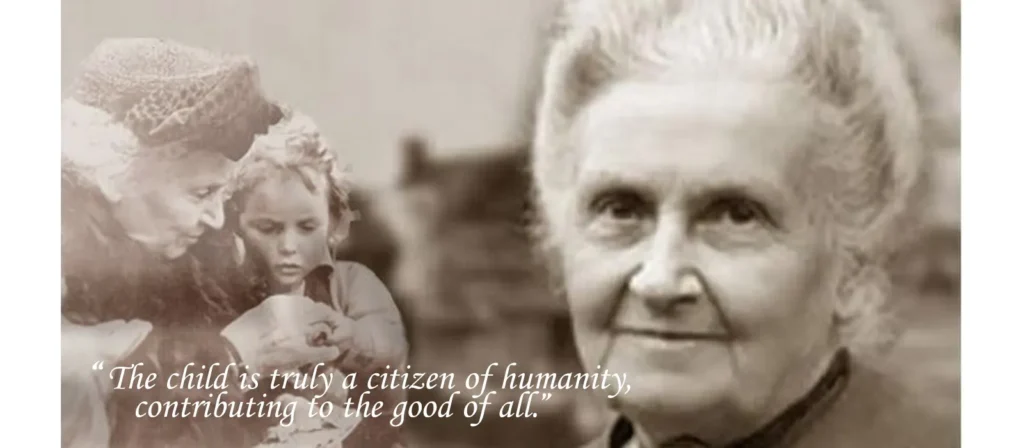
60. “To consider the school as a place where instruction is given is one point of view. But to consider the school as a preparation for life is another.”
Montessori draws a clear distinction between traditional schooling and education for human development. Classrooms should not simply transmit facts but help children prepare for real life. Education must include emotional, moral, and practical growth. This vision demands a change in purpose, not just in methods. Schools must serve the whole child, not just the curriculum.
61. “The child is the forgotten citizen, and yet if statesmen and educationalists once came to realize the terrific force that is in childhood, they would give it priority above all else.”
Montessori calls attention to the social invisibility of children. Despite being the foundation of the future, they are rarely included in serious planning. She insists that education should be society’s first concern. The child is not just vulnerable but powerful, and how we educate determines how society evolves. Ignoring childhood means ignoring humanity’s destiny.
62. “Education as conceived today is separated from biological and social life.”
Here, Montessori critiques the artificial nature of schooling. She believed that real education must reflect the rhythms and needs of life itself. Children should not be removed from reality but immersed in meaningful activities. When learning becomes disconnected from experience, it loses value. True education must be part of life, not apart from it.
63. “The child is endowed with an inner power which can guide us to a more enlightened future.”
This quote expresses Montessori’s faith in the hidden potential of children. Education should uncover and support this power, not suppress it. When free to develop naturally, children reveal intelligence, compassion, and order. These qualities form the basis of social renewal. Adults must respect, observe, and prepare—not control.
64. “The adult must find within himself the still unknown error which prevents him from seeing the child as he is.”
Montessori believed that adults are often blind to the child’s true nature. This blindness leads to miseducation. Teachers and parents must examine their own assumptions and fears. Education requires self-awareness and humility. The adult must change first, in order for the child to grow freely.
65. “A child who has become master of his acts through long and repeated exercises… is a child filled with health and joy and remarkable for his calmness and discipline.”
In Montessori’s view, self-discipline arises through freedom and repetition, not punishment. Children who are allowed to work independently gain control over their movements and emotions. This mastery brings joy and peace. Discipline becomes an internal strength rather than external obedience. The classroom should support this quiet formation.
66. “The child is truly a citizen of humanity, contributing to the good of all.”
Montessori believed that the child is not just preparing for the future but is already part of society. Even in early childhood, their thoughts and actions matter. Education must reflect this dignity. By engaging in meaningful work and relationships, children contribute to a peaceful, connected world. They are not waiting to become citizens. They already are.

